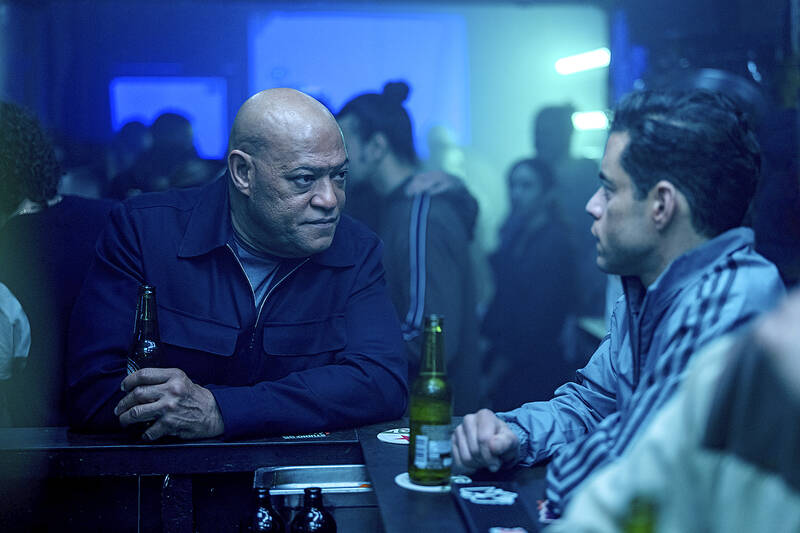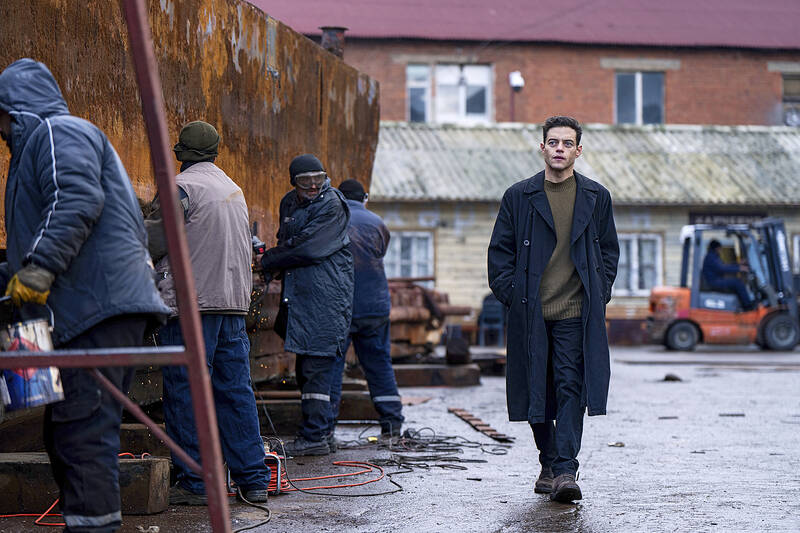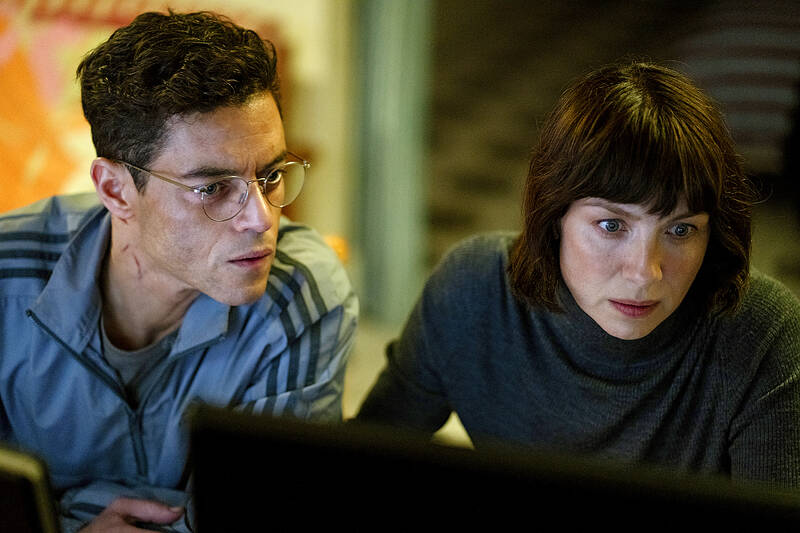Before Jack Ryan was introduced into the culture, Robert Littell imagined Charlie Heller, a quiet, CIA cryptographer who goes rogue on a quest for vengeance after his love is killed by terrorists.
As star of The Amateur, currently in Taiwan theaters, Rami Malek gets to be both skittish nerd and coolly competent angel of death. He’s the homebody and perpetual rule-follower who in grief-stricken madness decides to blackmail his bosses and go on an international killing spree to get the people responsible for her death.
The story is based on a book published in 1981 — a product of its Cold War context that was even made into a movie starring John Savage. But even with the Iron Curtain and the Holocaust in its DNA, it also has the kind of foundation that’s essentially evergreen in Hollywood. There’s tragedy, drama, cinematic globetrotting and a fish-out-of-water story that’s a little more relatable than watching some preternaturally talented superspy (at least in theory).

Photo: AP
In this newest take, credited to screenwriters Ken Nolan and Gary Spinelli and directed by James Hawes, the story has been updated for the modern age, with decidedly murky international politics and sophisticated facial and voice recognition software that can identify masked terrorists and their networks and find rogue agents in an instant.
The locations are many: London, Paris, Marseille, Istanbul included. The cast is stacked: Laurence Fishburne is a veteran assassin who agrees to train Charlie, Rachel Brosnahan is the dead wife, Julianne Nicholson is the CIA director, Holt McCallany is Charlie’s shady boss. Jon Bernthal, Caitriona Balfe and Michael Stuhlbarg also play pivotal roles. And anyone who has seen the trailer has already gotten a preview of the most impressive set piece, involving a glass infinity pool.
The Amateur has a lot going for it — but it takes also takes a while to get going. Once it does, it can’t quite maintain a level of energy and suspense needed to justify its runtime. This might be because the film is attempting to be something that’s equal parts action-packed and meditative, but for us that means listening to several conversations about the nature of killing that start to sound quite repetitive.

Photo: AP
There’s this throughline that Charlie is not a born killer. While a court of law might disagree, everyone in this film seems to think that there’s something different between shooting someone point blank and, say, setting up an elaborate trap that you know will result in a death. Still, it seems like that is a debate that could end after he does intentionally kill someone and goes looking for more.
It’s interesting what a film like this chooses to focus on and what it disregards. At the beginning, Charlie declines his wife’s invitation to accompany her to London, where she will of course die. He regrets this deeply, but we’re also told that he always declines: He doesn’t travel internationally almost as a rule. Why? Unclear, but you’d think perhaps this might factor into the plot somehow as he begins his globetrotting.
Instead, it’s not an issue at all: He capably navigates all manner of transport across Europe, from cargo flights to busses full of migrants. There are other underdeveloped curiosities, like Jon Bernthal as a cool guy superspy with basically two scenes that don’t seem to advance the story at all. And don’t get me started on poor Brosnahan as the dead wife who we’re constantly being told “mattered” but who we know so little about. Sarah is often seen in flashback in flowy floral dresses doting on her quirky husband in their idyllic Virginia farmhouse. To the film’s credit, they don’t show her laughing under white sheets.

Photo: AP
But perhaps this is asking too much of a big screen spy spectacle in which Malek is compelling as an unlikely vigilante — even if we might not totally understand why he’s decided this is the only way. He doesn’t exactly sell it the way Harrison Ford was able to in Patriot Games, though that’s an unfair bar.
With James Bond in a reset mode and Ethan Hunt promising final reckonings, most of the good globetrotting spy thrillers seem to have migrated to the small screen lately. Something about the episodic nature of it suits the genre, whether it’s Slow Horses, Black Doves or even Jack Ryan. But, as with Black Bag from earlier this year, it’s always welcome when we get an offering on the big screen: They just look better there.

Photo: AP

The Lee (李) family migrated to Taiwan in trickles many decades ago. Born in Myanmar, they are ethnically Chinese and their first language is Yunnanese, from China’s Yunnan Province. Today, they run a cozy little restaurant in Taipei’s student stomping ground, near National Taiwan University (NTU), serving up a daily pre-selected menu that pays homage to their blended Yunnan-Burmese heritage, where lemongrass and curry leaves sit beside century egg and pickled woodear mushrooms. Wu Yun (巫雲) is more akin to a family home that has set up tables and chairs and welcomed strangers to cozy up and share a meal

Dec. 8 to Dec. 14 Chang-Lee Te-ho (張李德和) had her father’s words etched into stone as her personal motto: “Even as a woman, you should master at least one art.” She went on to excel in seven — classical poetry, lyrical poetry, calligraphy, painting, music, chess and embroidery — and was also a respected educator, charity organizer and provincial assemblywoman. Among her many monikers was “Poetry Mother” (詩媽). While her father Lee Chao-yuan’s (李昭元) phrasing reflected the social norms of the 1890s, it was relatively progressive for the time. He personally taught Chang-Lee the Chinese classics until she entered public

Last week writer Wei Lingling (魏玲靈) unloaded a remarkably conventional pro-China column in the Wall Street Journal (“From Bush’s Rebuke to Trump’s Whisper: Navigating a Geopolitical Flashpoint,” Dec 2, 2025). Wei alleged that in a phone call, US President Donald Trump advised Japanese Prime Minister Sanae Takaichi not to provoke the People’s Republic of China (PRC) over Taiwan. Wei’s claim was categorically denied by Japanese government sources. Trump’s call to Takaichi, Wei said, was just like the moment in 2003 when former US president George Bush stood next to former Chinese premier Wen Jia-bao (溫家寶) and criticized former president Chen

President William Lai (賴清德) has proposed a NT$1.25 trillion (US$40 billion) special eight-year budget that intends to bolster Taiwan’s national defense, with a “T-Dome” plan to create “an unassailable Taiwan, safeguarded by innovation and technology” as its centerpiece. This is an interesting test for the Chinese Nationalist Party (KMT), and how they handle it will likely provide some answers as to where the party currently stands. Naturally, the Lai administration and his Democratic Progressive Party (DPP) are for it, as are the Americans. The Chinese Communist Party (CCP) is not. The interests and agendas of those three are clear, but